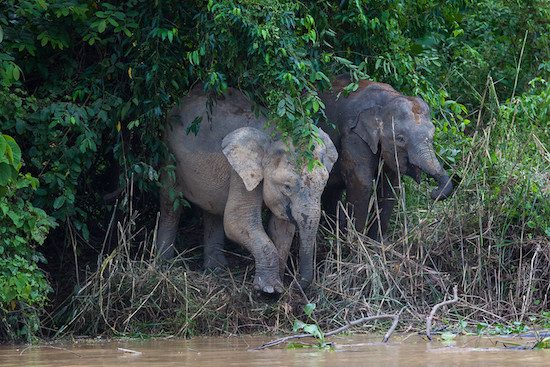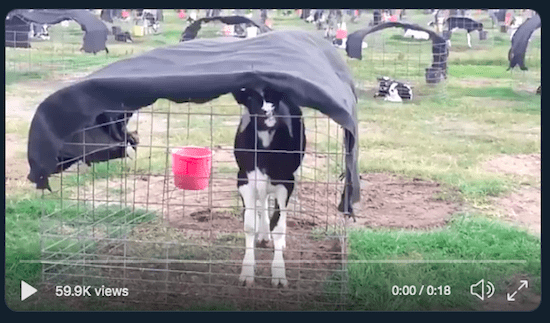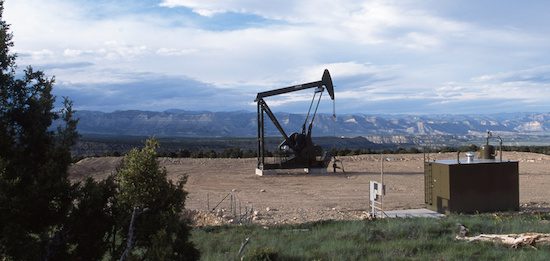


Rainforest Rescue: Around 350 endangered pygmy elephants live in Sabah, Borneo, near the Kinabatangan River. Until recently, their forest was so remote that poaching was all but unknown, and the elephants lived in peace. But over the last decade, criminals have discovered the region. Poachers are not only seeking ivory, but also elephant skin and other body parts for the Chinese market. In 2017, following international protest, the government backed off a plan to build a bridge across the river and roads into the forest–which would have made life much easier for poachers and illegal settlers and fragmented the elephants’ habitat. But now a new government has taken power in Sabah and the project is back in action, putting pygmy elephants and other wildlife in immediate danger.
>>>Urge Sabah Prime Minister Tun Mahathir bin Mohamad to scrap this project.
Mercy for Animals: Venezuelan actress María Gabriela de Faría narrates new video footage captured by undercover investigators that reveals—for the seventh time—the appalling treatment of animals that continues inside slaughterhouses across Mexico. Cows have been repeatedly shot, kicked, cut open and left to bleed—all while conscious and able to feel pain. One cow was shot in the head four times and ultimately hit in the head with an ax, but remained conscious and able to feel pain as she was slaughtered. Even more shocking, other cows have been killed while pregnant. Animal activists were instrumental in securing a unanimous point of agreement in Mexico’s senate that encourages the country’s Department of Agriculture to implement supervision and inspections of Mexican slaughterhouses—and shut down establishments that engage in such extreme acts of cruelty. Now it’s time for the government to take action.
>>Demand that the Mexican Department of Agriculture end this extreme cruelty immediately.
Care2: The war on destructive plastic pollution ratcheted up in 2019, and activist efforts are working. Major companies like Starbucks have ditched plastic straws. As of this year, more than 400 cities and states have banned single-use plastic bags. These steps make a difference, but for the biggest change, the biggest polluters must act. This year on World Clean Up Day—a day when tens of thousands of people clean up plastic litter—volunteers dug through the trash they picked up to figure out where it came from. Unsurprisingly, Coca-Cola, Pepsi and Nestlé products made up such a huge amount of the haul that they were dubbed 2019’s top polluters. We know how bad plastic is for the environment. It leaches into our water, poisoning wildlife and people alike with dangerous chemicals. It chokes marine animals who mistake tiny pieces of plastic for food. These three companies know all of this too. Yet their core products are still packaged in non-biodegradable plastic that will continue to damage our planet for centuries to come. It’s time for these industry leaders to actually lead the industry toward a more sustainable future.
>>>Urge Pepsi, Coca-Cola and Nestlé to reduce their plastic pollution now.
Cause for concern…

- Is there more cruelty in a glass of milk or pound of beef? (Rachel Curit, One Green Planet)
- Global pollution is rising again and won’t peak before 2040 (Jeremy Hodges, Bloomberg)
- California’s fossil fuel companies have polluted more since cap-and-trade started (Lisa Song, ProPublica)
- 60 percent of U.S. Superfund sites are in areas vulnerable to flooding or other worsening disasters of climate change (Ellen Knickmeyer, Associated Press)
- Big plastic polluters accused of cynically backing EPA’s America Recycles Day (Emily Holden and Oliver Milman, The Guardian)
- The plight of koalas impacted by Australia’s wildfires is raising fears about climate change and the future of the species (Livia Albeck-Ripka, The New York Times)
- Trump’s EPA to limit science used to write public health rules (Lisa Friedman, The New York Times)
- Can Thanksgiving turkeys really be ‘humanely raised?’ Labels lie, says new report (Heather Shields, Lady Freethinker)
Round of applause…

- Fossil fuel leases have been suspended as courts rule against Trump administration for ignoring climate impact (Nicholas Kusnetz, InsideClimate News)
- Planting billions of trees is the ‘best climate change solution available today,’ study finds (Olivia Rosane, EcoWatch)
- America’s largest cow milk producer files for bankruptcy, citing decline in consumer demand (Jordan Valinsky, CNN Business)
- Animal rights activists stage rare protest in Cuba’s capital (Andrea Rodriguez, Associated Press/Newser)
- Cambodia to ban elephant rides at Angkor temples (AFP and Chris Dyer, Daily Mail)
- Paris moves to ban wild animals from circuses (AFP, The Local)
- New research suggests link between plant-based diets and lower risk of dying from a heart attack, stroke or other cardiovascular disease (Journal of the American Heart Association)
- The rise of natural winemaking means more accidentally vegan vintages (Janet Forgrieve, SmartBrief)
- Vegan Thanksgiving is the best, really (Genevieve Ko, Los Angeles Times)
Parting thought…
“It’s not just climate change; it’s sheer space, places to grow food for this enormous horde. Either we limit our population growth or the natural world will do it for us, and the natural world is doing it for us right now.” —Sir David Attenborough